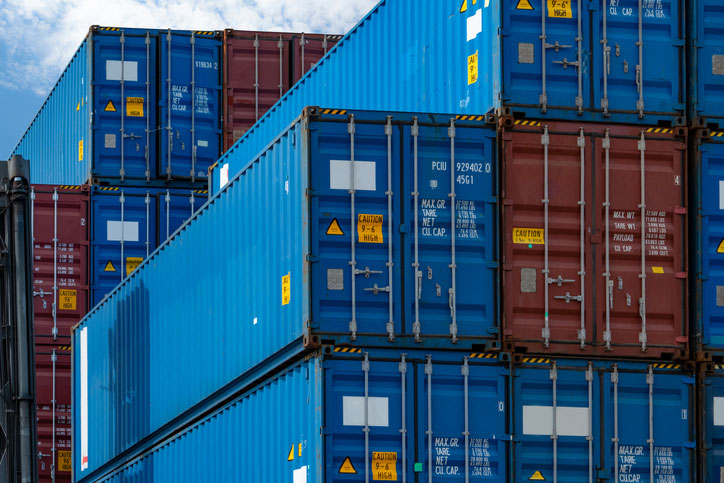Written by Scott Wilson

While the process of acquiring, storing, and transporting goods is as old as commerce itself, it’s become a linchpin in the modern world of global supply chains. And when a perfect storm of increased demand and labor shortages hit in the wake of the COVID-19 pandemic, that linchpin started to come loose. In one way or another, everyone felt the effects, and the importance of maintaining logistical efficiency at every level of the supply chain came into focus.
One of the things the pandemic exposed was a sort of collective failure of imagination and expertise in the logistics world. When ships were stalled in anchorages, borders closed, and delivery drivers called in sick, the fragility of the supply chain became clear.
This has created a new emphasis on education and skill in the logistics management world. And it’s the sort of training you’ll only find in a degree in logistics and supply chain management.
How is Logistics Different from Supply Chain Management? – And, how is Logistics Related to Supply Chain Management?

Logistics is the process of coordinating operations to procure, deliver, and store any sort of resource. People, pig iron ingots, printed silicon wafers, boxes of broccoli… it’s all part of the logistics train in some kind of business.
Logistics is distinct from supply chain management (SCM) in that SCM encompasses the entire scope of acquiring, processing, manufacturing, and delivering goods. Logistics is the part of that process that involves moving stuff around and storing it.
But logistics is such a critical part of the supply chain management process that you will often find the two mentioned in the same breath. Indeed, it’s common to find degrees in supply chain management and logistics. Naturally, degree programs with a primary focus on the logistical aspects of supply chain management will give more attention to rubber-meets-the-road, boots-on-the-ground practical considerations related to coordinating transport and storage as things are moved from point to point.
The distinctions between the two aren’t hard and fast in businesses, either—a job that would be labeled as supply chain manager in one organization may be called logistics manager in another.
From the Designer’s Imagination to Your Closet in 15 Days
 If there is an industry that exemplifies the power of logistics, it’s fast fashion.
If there is an industry that exemplifies the power of logistics, it’s fast fashion.
Style is a notoriously hard factor to plan around. Traditional haute couture brands plan months ahead, figuring out colors and fabric and patterns to distribute to overseas manufacturers in time for the seasons.
But a subset of fashion retailers realized in the 1990s and 2000s that trends were moving too fast for traditional methods. Rather than trimming production costs, they saw an opening for reacting swiftly to the market.
Spanish retailer Zara was one of the pioneers. Waiting to see what was hot after top designers made a splash on the runway, they took advantage of their vertically integrated production and regional suppliers to quickly ship the latest designs to stores around the world.
A strong understanding of logistics and precise execution created a whole new industry, one that still dominates malls and high streets today.
What Will You Learn in a Logistics Management Degree Program?

The core aspects of logistics and supply chain management have a lot of overlap. It’s inevitable that you’ll learn many of the same concepts and principles as part of your studies.
Logistics degrees are heavily focused on the practical parts of getting stuff where it needs to be, when it needs to be there, and in good condition.
When degree programs unfold the basic rules to teach the sub-field of logistics distinct from SCM, you find courses covering areas such as:
- Warehousing and Materials Management - These classes deal with the basics of organization, climate control, and warehouse operations.
- Transportation - Courses that cover every possible mode of transportation and the risks and benefits of each for different types of products and materials.
- Supply Chain Operations - Even if logistics is only a piece of the larger pie of supply chain management, you need a big picture view of the process to be an effective logistics leader.
- Procurement - Contracts and outsourcing, material acquisition, and other considerations involved in procuring the resources you’re going to be storing and moving.
- Management and Leadership - Essential coursework in the basics of team-building, inspiration, and administration prepares you for management roles in logistics.
- Analytics - You’ll learn how to acquire and interpret performance data that make logistics operations safer and more efficient.
Of course, there are dozens of different variations on all those subjects. Truck transportation, specialized materials handling, contract management, and other topics may be offered as their own classes.
There are also hundreds of electives to choose from, particularly in bachelor’s and master’s degree courses. You can build your own curriculum designed to launch you into the industry or specialty of your choice.
Hands-on Learning Is Common in Degrees in Logistics Management

Logistics professionals agree that it’s not enough to sit through lectures on inventory optimization and warehouse organization. You need to get your hands dirty to really absorb the lessons learned.
That’s why most logistics degrees also come with internship opportunities for on-the-ground experience. Supervised by both active logistics managers and your professors, you’ll learn how to apply the lessons you’ve learned in the classroom out in the real world. Internships will take you to the corporate offices of shipping, transport, and warehousing companies, and put you on-site for a front-row seat of what’s happening down on the docks and at shipping and storage facilities.
Specialized Degree Options Help Prepare You for Specific Logistics Roles
There are a lot of branches on the logistics tree. You can dive deep into subsets and become specialized enough to make a career out of areas as niche as refrigerated transport for vaccines and other pharmaceuticals with strict temperature controls.
Honing that expertise early comes through degree specializations. Logistics degrees commonly come with options such as:
- Global logistics
- Transportation management
- Warehouse management
- Materials management
Logistics is so integral to business that you’ll find it’s available as a specialty itself in many business degrees. A Bachelor of Business Administration in Logistics and Supply Chain Management or a Master of Business Administration in Logistics Management are some common examples.
These programs put the nuts and bolts of business management and leadership first. So, you’ll primarily get coursework in subjects like:
- Economics and accounting
- Business communications
- Strategic planning
- HR and management processes
Logistics classes will also come with the package, but there are likely to be fewer of them and they may be more general than what you’d find in a dedicated logistics degree.
Still, this approach can make a lot of sense. Particularly for anyone heading for senior leadership ranks, a strong business background is essential. With subordinates to handle the day-to-day aspects of logistics operations, it can be enough for you to have the big picture view that these degrees provide.
What Level of Degree in Logistics Management Should You Pursue?

Logistics studies come in layers, from the most basic all the way up to doctoral degrees that turn supply chain operations into science.
Of course, the degree level you pursue will have a lot to do with the depth of knowledge in logistics you come away with. That, in turn, can have a lot to do with your opportunities in the job market.
But the degree level you pursue can depend on more than just your career objectives. The amount of time they take to earn, the amount of money they will cost, and other training you may need to pick up along the way all play into your decision.
Here’s a snapshot of what the different levels of logistics management degrees look like, as well as the average costs as provided by the National Center for Education Statistics from 2022 data on tuition and fees. Naturally, private schools will cost you more and public universities and community colleges tend to be less.
Associate Degrees in Logistics Management
- Average Cost: $5,718
- Length: 2 years
Programs like an Associate of Applied Science (AAS) or Associate of Science (AS) in Logistics Management offer introductory courses in warehousing, logistics, and distribution. They come with basic general ed classes in communication, math, and social studies to give you the grounding for additional study or advancement in the field. With transfer agreements between community colleges and local 4-year schools, AS degrees are generally designed to fulfill the first two years of a bachelor’s program, while applied science degrees are not.
Bachelor’s Degrees in Logistics Management
- Average Cost: $69,000
- Length: 4 years
A Bachelor in Transportation and Logistics Management and similar degrees go beyond the basics, delivering a full-spectrum education in the liberal arts as well as specialized logistics studies. The emphasis on general knowledge, communications, and critical thinking gives you the blend of skills necessary for management positions. Though a bachelor’s of some kind is a prerequisite for studying at the graduate level, you don’t necessarily need a bachelor’s in logistics to enroll in a master’s or MBA in the field.

Master’s Degrees in Logistics Management
- Average Cost: $39,498
- Length: 2 years
A Master of Science in Logistics Management goes into critical detail about advanced concepts in transportation and storage management. Coursework in statistics and research equips you for more senior roles and heavyweight decision-making.
Master of Business Administration in Logistics Management
- Average Cost: $39,498-$59,247
- Length: 2-3 years
An MBA with a Concentration in Logistics Management or similar concentration (Supply Chain Logistics Management, Logistics and Supply Chain Management, etc.) offers a business-first education in executive skills. With logistics and transportation thrown in, one of these elite degrees is preparation for senior executive positions in supply chain operations
Doctoral Degrees in Logistics Management (PhD and DBA)
- Average Cost: $59,247 - $98,745
- Length: 3-5 years
It’s most common for degrees at the highest level to combine logistics and supply chain management studies, as with a DBA (Doctor of Business Administration) in Logistics and Supply Chain Management. You will also find pure PhD in Logistics programs, though. These are most often oriented at academic and research roles, although DBAs have a more practical angle.
Certificates in Logistics Management (undergraduate, post-bachelor’s, and post-master’s)
- Average Cost: Variable
- Length: Variable
A certificate program offers a quick hit of specific knowledge in logistics subjects. You can find these short-course options at the undergraduate level, but most often they are designed as post-degree programs for career changers or professionals in the field looking to advance. In many cases, they are highly specialized, delivering detailed training in a specific subject like procurement or transportation and distribution. In other cases, they offer a high overview, intended to give practicing professionals from a non-logistics background a solid intro to the field. A certificate program is an educational experience, usually a slice of some college degree classes at universities offering full bachelor’s and master’s in the field.
Selecting the Right School for Your Logistics Management Degree

Picking a college for your logistics studies comes down to essential considerations like:
- Professors - Instructors with actual experience in the industry, plus academic and research skills are the ones you want.
- Resources - Volumes of industry data and journal access, labs with current versions of modern logistics software, and campus student groups focused on logistics are things you’ll want access to.
- Academic support - Strong counseling and advising services will help you optimize your schedule and get through your classes.
- Reputation - Like any organization, schools get a reputation in the industry and among graduates that is reflective of their skill and quality.
On top of that, however, there are a couple of special considerations in logistics studies that can be school specific.
The first is business and industry connections. The world of logistics in, say, high tech can be considerably different than it is in agricultural production. Concepts can be the same, but how you put them into practice, and where the emphasis is, may be night and day.
So, you’ll want to pick a college that has strong ties to the industry you are most interested in joining. You’ll find yourself learning the most relevant logistics applications, and making the right kinds of connections with companies and individuals who can help your career.
The second consideration is specialty accreditation. This is a specific evaluation and approval over and above the general accreditation that all reputable American universities hold. It is offered by specialty accreditors who look at a certain type of education and dive into it in great detail.
There is no logistics specialty accreditor, but many programs are offered by business schools, which are covered by three different organizations:
- AACSB (Association to Advance Collegiate Schools of Business)
- IACBE (International Accreditation Council for Business Education)
- ACBSP (Accreditation Council for Business Schools and Programs)
Where they are eligible, programs that have the stamp of approval from any of these three accreditors offer you an assurance that they deliver an education in line with the expectations of the business community.
Earning an Online Degree in Logistics Management

Like the logistics field itself, many degree and certificate programs are going remote these days. An online degree program offers plenty of advantages to aspiring logistics professionals:
- Greater choice of programs - When you can select from schools nationwide without having to worry about a commute or relocation, you have far more options than sticking close to home. That can make it more likely for you to find and be accepted in a program that is the perfect fit for your goals.
- More flexibility for work and family - An online degree is typically offered asynchronously—with no fixed times for attendance. That allows you to shift your education schedule around your real-life schedule.
- More control and fewer expenses - Staying close to home also has financial advantages. Without relocation or paying for higher costs in college towns, you can save a bundle pursuing an online degree. And you can adjust your workload to your availability, which keeps stress down and productivity up.
Jobs for Graduates with a Degree in Logistics Management
If you glanced at the kind of courses you’ll be studying in a logistics degree program and were amazed at how much ground they cover, this is where it pays off. The range of jobs that you will be qualified for spans the whole spectrum of the supply chain.
The demand for skilled logistics managers in companies in every industry is higher today than ever. And according to the Bureau of Labor Statistics (BLS), it’s only going to grow further—the job category for logisticians, for instance, is forecast to grow by 28 percent between 2021 and 2031.
Of course, the particulars of those jobs will depend a lot on the level and specialization of the degree you have earned.
Associate Degree Level Logistics Management Jobs
The kind of hands-on, front-line jobs that keep packages moving are the province of associate graduates with logistics degrees. Titles can include:
- Logistics Coordinator
- Inventory Clerk
- Load Planner
- Dispatcher
- Supply Chain Technician
Bachelor’s Degree Level Logistics Management Jobs
Bachelor’s grads have more communications training and battle-tested problem-solving skills. That generally puts them in line for higher level positions, including entry-level management roles. They can include:
Master’s/MBA Level Logistics Management Jobs
- Inventory Planner
- Logistics and Distribution Manager
- Transportation Analyst
- Storage Manager
A master’s is what you get if you plan on entering the highest-level positions in logistics and supply chain management. The in-depth technical detail combined with a strong business overview enables you to make the big decisions… and get paid big bucks in jobs like:
- Senior Operations Manager in Shipping and Logistics
- Senior Warehouse Manager
- Procurement, Materials, and Logistics Manager
- Director of Supply Chain
- Head of Global Logistics Operations
Salary Expectations That Come with Logistics Management Degrees

What exactly do the big bucks look like? Well, in those senior roles, BLS has a little trouble pinning them down. They fall into the category of top executives. But that also includes many positions that don’t necessarily have anything to do with supply chain management.
Still, the median salary for that category in 2021 was $98,980, which is likely in the ballpark for senior logistics and supply chain executives, the most likely to have master’s degrees in logistics. At the top end of the scale, they can knock it out of the park with a salary over $208,000 per year for the top ten percent. That’s the limit of measurement over at BLS, so the true compensation, plus bonuses and stock grants, can be much higher.
For bachelor’s graduates, roles are more likely to fall into the BLS category for transportation, storage, and distribution managers. In 2022, that category earn an average of $98,560 per year. The top ten percent, with more experience and education, could earn over $169,070.
For associate degree holders, jobs tend to come into the category of logisticians. The average salary for those positions came in at $77,250 per year as of 2022. It may be unusual to start out at that rate, however; entry-level jobs are more likely to run near the bottom ten percent, at $45,160 annually.
In every case, at every level, the surge in demand for professionals who hold logistics management degrees is likely to keep upward pressure on salaries high for the next decade at least. And with the benefit of experience and additional study, you will find opportunities to boost your pay for the remainder of your career in this hot field.
2022 US Bureau of Labor Statistics salary and employment figures for Top Executives, Logisticians, and Transportation, Storage, and Distribution Managers reflect national data, not school-specific information. Conditions in your area may vary. Data accessed July 2023.







